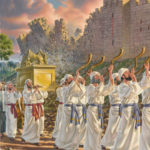The text for this lesson is Joshua 3:1–5:12
Key Point
- Led by Joshua through the Jordan River, Israel left the desert and entered the Promised Land. Led by Christ through the water of our Baptism, we leave behind the desert of sin, death, and Satan and enter into the promised land of His heavenly kingdom.
- Law: Complaining and unrepentant, I wander in a desert of sin, determined to go my own way—a way that leads to death.
- Gospel: In Baptism, Christ lifts me from the grave, joins me to His own Baptism and Body, the Church, and leads me to my heavenly home.
Discussion Points
- Think back to the last graduation ceremony you attended. What ceremonies and symbols marked the end of one phase of life and the beginning of the next? Was the focus on the past or on the future?
- Read Joshua 3:1–6, 14–17. What does the ark of the covenant represent, and what role does it play during the crossing of the Jordan River? What does it tell us about the Israelites’ relationship with God?
- Read Joshua 4:1–8. Why did God command them to make a memorial? How did it represent an end and a new beginning? Are there memorial “signs” that you can identify at church? in the liturgy?
- Read Joshua 5:2–12. What was the significance of circumcision and the Israelites’ celebration of the Passover?
- This story is filled with connections to other “water” passages in the Bible. Skim Genesis 7–8; Exodus 14; 2 Kings 5; and Matthew 3. How do these Scripture passages use water to mark an end and a new beginning?
- The Israelites began a new life surrounded by symbol and ceremony. When do Christians begin their new life? What symbols and ceremonies surround this event? What part of this event is not symbolic?
- God instructed the Israelites to create a memorial to remember the day they entered their new life. How are Christians to do the same thing with respect to their Baptism?







